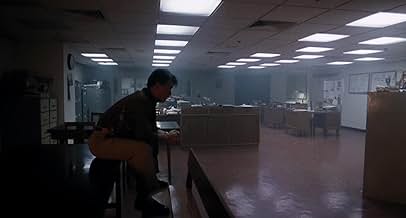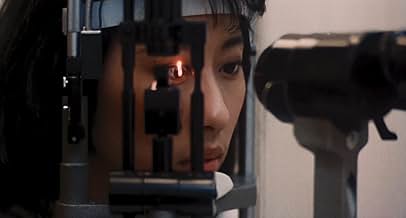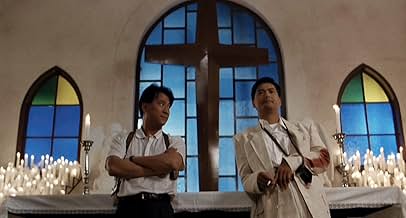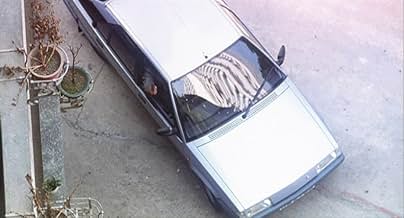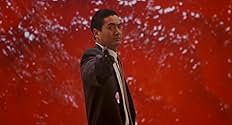NOTE IMDb
7,7/10
53 k
MA NOTE
Un assassin désabusé accepte un dernier job dans l'espoir d'utiliser ses gains pour redonner la vue à un chanteur qu'il a accidentellement aveuglé.Un assassin désabusé accepte un dernier job dans l'espoir d'utiliser ses gains pour redonner la vue à un chanteur qu'il a accidentellement aveuglé.Un assassin désabusé accepte un dernier job dans l'espoir d'utiliser ses gains pour redonner la vue à un chanteur qu'il a accidentellement aveuglé.
- Réalisation
- Scénario
- Casting principal
- Récompenses
- 2 victoires et 6 nominations au total
Chow Yun-Fat
- Ah Jong
- (as Chow Yun Fat)
Kong Chu
- Sydney Fung
- (as Chu Kong)
- …
Kenneth Tsang
- Sgt. Tsang Yeh
- (as Tsang Kong)
- …
Shing Fui-On
- Wong Hoi
- (as Shing Fui On)
Ricky Chun-Tong Wong
- Frankie Fung
- (as Fan Wei Yee)
Chuen Chiang
- Shooter at beach
- (non crédité)
Chin-Hung Fan
- Shooter at beach
- (non crédité)
Woon-Ling Hau
- Trash lady
- (non crédité)
Avis à la une
Chow Yun Fat and John Woo strike again. The Killer is not your run of the mill action flick. It features characters you care about, jaw-dropping action sequences, and , best of all, Chow Yun Fat. He's always supercool. Chow and co-star Danny Lee play very similar characters but are on opposite sides of the law. It makes the film work very well. The heroes can relate to one another because they have both injured the innocent while doing their jobs. Another great actor in the film is Kong Chu in the role of Sydney, the one handed hitman. Being in the middle of the fray, he makes for an interesting character. There is a great scene involving Sydney's betrayal. Chow is so amazing with his emotions in this scene. He's not just an international action superstar, he's an underrated and incredible actor as well. That's what makes The Killer more than just another action movie. Woo's direction always helps too. The Killer boasts one of the best and most epic shootouts in film history. Woo's older films are as stylistic as they get, I mean stylistic as hell. Chow Yun Fat and John Woo make an incredible duo. Nicholas Cage is no replacement, it's high time they work together again.
10Anardil
Before seeing a genuine Hong-Kong produced John Woo movie, I thought I knew what action was, and what the action-movie genre was capable of. I was wrong. The Killer was the single most impressive, awe-inspiring, jaw-dropping action movie I had seen in years, and is now one of my favourite movies of any genre. It is #2 on my all-time list.
Why? First of all, the well-known poetic violence of the super-charged action scenes make for a tremendously exciting film. These combine choreographed bloodshed (there is an almost constant stream of bullets) with raw emotion that puts even the best Hollywood actioners to shame. Look at Hollywood action movies today; almost all Hollywood action is inspired (not to mention plagiarised) from the "heroic bloodshed films," the best of which is The Killer.
Quentin Tarantino and Robert Rodriguez are only the most obvious examples of American directors to put Woo's trademark stylized violence to use, and neither handle it as well as Woo.
But beyond this, the characters and the story are what drive this movie and what truly set it apart. The story of the relentless cop and the vicious killer is only the latest in a long line of detective stories, starting with Arthur Conan Doyle and Edgar Allan Poe in the 19th century, and continuing in every cop show on TV today. The hero and the villain are practically the same; they are only divided by an almost arbitrary line called the law. In The Killer, both "Mickey Mouse" and "Dumbo" are unrelenting, capable, though misunderstood, professionals. Their motivations differ, but they both have the killer instinct. The classic storyline of the interaction of the two characters who eventually realize their similarities and end up working together has been seen before, but never has it been used to such effect as in The Killer.
Woo's familiar themes of brotherhood, betrayal and loyalty also reach their cinematic peak in this movie. The viewer not only wants to see the next pyrotechnic action scene, but is actually concerned with the lives of the characters, an element that is almost always lacking in typical Hollywood fare.
Finally, the gun-battle scenes, when they come, are simply the most spectacular, mind-blowingly violent, yet strangely beautiful, action scenes ever imagined or filmed. And last but not least, is the unbelievably powerful screen presence of Chow Yun-Fat, as always cool incarnate. His effortless lead and the tension created by his playing off of co-star Danny Lee make The Killer as close as I have yet seen to the perfect action movie. I recommend it to any hard-core action fan and also suggest Hard-Boiled, though Woo's American efforts thus far have not been up to his Hong Kong works.
Rating: 10
Why? First of all, the well-known poetic violence of the super-charged action scenes make for a tremendously exciting film. These combine choreographed bloodshed (there is an almost constant stream of bullets) with raw emotion that puts even the best Hollywood actioners to shame. Look at Hollywood action movies today; almost all Hollywood action is inspired (not to mention plagiarised) from the "heroic bloodshed films," the best of which is The Killer.
Quentin Tarantino and Robert Rodriguez are only the most obvious examples of American directors to put Woo's trademark stylized violence to use, and neither handle it as well as Woo.
But beyond this, the characters and the story are what drive this movie and what truly set it apart. The story of the relentless cop and the vicious killer is only the latest in a long line of detective stories, starting with Arthur Conan Doyle and Edgar Allan Poe in the 19th century, and continuing in every cop show on TV today. The hero and the villain are practically the same; they are only divided by an almost arbitrary line called the law. In The Killer, both "Mickey Mouse" and "Dumbo" are unrelenting, capable, though misunderstood, professionals. Their motivations differ, but they both have the killer instinct. The classic storyline of the interaction of the two characters who eventually realize their similarities and end up working together has been seen before, but never has it been used to such effect as in The Killer.
Woo's familiar themes of brotherhood, betrayal and loyalty also reach their cinematic peak in this movie. The viewer not only wants to see the next pyrotechnic action scene, but is actually concerned with the lives of the characters, an element that is almost always lacking in typical Hollywood fare.
Finally, the gun-battle scenes, when they come, are simply the most spectacular, mind-blowingly violent, yet strangely beautiful, action scenes ever imagined or filmed. And last but not least, is the unbelievably powerful screen presence of Chow Yun-Fat, as always cool incarnate. His effortless lead and the tension created by his playing off of co-star Danny Lee make The Killer as close as I have yet seen to the perfect action movie. I recommend it to any hard-core action fan and also suggest Hard-Boiled, though Woo's American efforts thus far have not been up to his Hong Kong works.
Rating: 10
John Woo's "The Killer" shows a master at the height of his powers. Woo, today working in the United States, gained fame in Hong Kong through the two "Better Tomorrow" films. He became popular and used his success to go to greater things. In fact, much of Woo's HK work is similar, including the work he did in the early 90's like "Bullet in the Head" and "Hard Boiled". But "The Killer" shows John Woo as a perfectionist, the top director of action films who can perfectly blend in over-the-top violence with emotional drama.
"The Killer" follows John (Jeff in other versions of the film), who's played to utter perfection by Chow Yun Fat. John is a hit-man planning retirement. On one job, however, he accidentally shoots a singer (Jenny) near her eyes. She survives, but her vision is blurry. John saves her from a gang of rapist thieves, and the two ultimately fall in love with each other, despite Jenny never having seen John's face. On John's case, however, is Inspector Li, hard at work, who is intent on always getting his man. Much of the movie involves John and the results of his final job which ultimately pits him up against the entire mob, who want him dead for overexposing his identity. And the rest of the film follows John catering to Jenny's needs and helping her at every moment, all the while evading Li, who's getting closer and closer to stopping him.
To make the movie the memorable film that it is, Woo perfectly orchestrates some of the best shoot-outs ever seen on film. Much of what Woo did here, he was never able to follow up. "Hard Boiled" was interesting, but its final shoot-out, over 20 minutes in length, just couldn't keep up. It got boring by the end. What Woo does in "The Killer" is give you a sample of his powers and then leave you begging for more. And that what you'll be literally doing: begging for just a glimpse of the next dude victim to Fat's two beautiful handguns.
It's only sad to see that, not so much Woo doesn't do these films anymore, but that Woo rarely does good films now.(Period) He's too busy, working on ego with top stars and killer budgets. His two films that came as far as making an impact with me from his U.S. catalog will probably include "Broken Arrow" and "Face/Off", both primarily due to just how much I like Travolta (though the former was also an early film of mine that I really remember liking, since it was different from all the Disney and kid stuff I was used to). But Woo, intent on fulfilling his dreams of making a musical and captivating audiences with his powerful style, can just show the people a screening of this film. It's quoted as being "Violence as poetry", and that's exactly what it is. With the beautiful music adding feeling and depth to the characters and the great writing and direction, this is easily Woo's tour-de-force.
9.5/10 (****/****)
"The Killer" follows John (Jeff in other versions of the film), who's played to utter perfection by Chow Yun Fat. John is a hit-man planning retirement. On one job, however, he accidentally shoots a singer (Jenny) near her eyes. She survives, but her vision is blurry. John saves her from a gang of rapist thieves, and the two ultimately fall in love with each other, despite Jenny never having seen John's face. On John's case, however, is Inspector Li, hard at work, who is intent on always getting his man. Much of the movie involves John and the results of his final job which ultimately pits him up against the entire mob, who want him dead for overexposing his identity. And the rest of the film follows John catering to Jenny's needs and helping her at every moment, all the while evading Li, who's getting closer and closer to stopping him.
To make the movie the memorable film that it is, Woo perfectly orchestrates some of the best shoot-outs ever seen on film. Much of what Woo did here, he was never able to follow up. "Hard Boiled" was interesting, but its final shoot-out, over 20 minutes in length, just couldn't keep up. It got boring by the end. What Woo does in "The Killer" is give you a sample of his powers and then leave you begging for more. And that what you'll be literally doing: begging for just a glimpse of the next dude victim to Fat's two beautiful handguns.
It's only sad to see that, not so much Woo doesn't do these films anymore, but that Woo rarely does good films now.(Period) He's too busy, working on ego with top stars and killer budgets. His two films that came as far as making an impact with me from his U.S. catalog will probably include "Broken Arrow" and "Face/Off", both primarily due to just how much I like Travolta (though the former was also an early film of mine that I really remember liking, since it was different from all the Disney and kid stuff I was used to). But Woo, intent on fulfilling his dreams of making a musical and captivating audiences with his powerful style, can just show the people a screening of this film. It's quoted as being "Violence as poetry", and that's exactly what it is. With the beautiful music adding feeling and depth to the characters and the great writing and direction, this is easily Woo's tour-de-force.
9.5/10 (****/****)
The Killer is widely regarded as John Woo's best all round film, and makes an appearance on an extraordinary number of people's Top 10 lists. This may be because it was the first Hong Kong movie a lot of people saw, as it was one of the first to get any kind of widespread attention in the US. It doesn't feature in my own Top 10, but that's not because it isn't good
Chow Yun Fat plays the titular killer, an assassin who begins to regret his life of violence after accidentally blinding singer Sally Yeh during an assassination. Danny Lee plays the cop on his case, who begins to find he can relate to the killer more than he can to many of his colleagues. Both men are shown to be men whose values of loyalty and honour are increasingly being forgotten by the society in which they live.
THE KILLER pretty much defines the "Heroic Bloodshed" genre, taking the code of chivalry from the old swordplay films and bringing it into the world of guns and bullets. Woo basically started the whole genre with the seminal A BETTER TOMORROW, but THE KILLER is the most distilled vision of the concept he or anybody else in Hong Kong produced. It's a very romanticised film - even though the main characters earn their livings from violence, they're painted as very noble characters and starkly contrasted with the real villains (led by Shing Fui On in his best role ever) who kill without honour. There's a broad message of peace and restraint from violence there too, though it's somewhat conflicted with the romanticisation of some of the bloodshed.
John Woo and Chow Yun Fat were serious box office gold when THE KILLER was made - apart from another Jackie/Sammo/Biao collaboration there was probably no more anticipated collaboration than this one. As such, THE KILLER was afforded a budget and shooting schedule that most Hong Kong productions could never dream of (though still no doubt miniscule compared to any Hollywood film of the time). This is evident in the quality of the production on pretty much ever level. The film has as high production values as any Hong Kong film ever made, and is surely one of the most technically accomplished. Credit for this must be shared between cinematographer Peter Pau, producer Tsui Hark and of course director John Woo.
I've always suspected that the real talent behind the film was probably Tsui Hark - it's rumoured that Tsui & Woo fell out heavily because Tsui felt THE KILLER should be "A Tsui Hark Film" and not "A John Woo" film. Evidence for this is that Woo's earlier and later films have been largely lacking the substance and depth of THE KILLER (especially his Hollywood films, but everybody gets that in Hollywood). However, the interviews on the Hong Kong Legends DVD clearly show that Woo had a vision and pursuit of excellence that was the driving force in the project. He's spoken of very highly by his cast and DOP, who give him the full credit for the film's success. I'd like to hear Tsui Hark's side of the story though
The attention to detail in the film is most obvious in the cinematography. This was Peter Pau's first big film, and the one that established him as one of Hong Kong's top cinematographers. He gives Woo most of the credit for the film's visual style though, describing how much thought Woo would give to the way the camera should be positioned and move to bring out the emotional quality of the scene. I don't have the knowledge/education to be able to perceive how the camerawork in the film does contribute to the emotional depth, but I can acknowledge that it's effective.
Woo is often regarded by Western film makers as the best director of action in the world. I think Tsui Hark probably deserves that credit more, but Woo certainly redefined the way gunplay was choreographed and filmed. HARD BOILED is his finest work in this respect, but THE KILLER certainly comes second. The action was choreographed by Ching Siu Tung, who was evidently a little uncomfortable with choreographing gunplay when he worked on A BETTER TOMORROW 2 (sorry, but most of the shoot outs in that are just people running round randomly waving their guns at stuntmen). He'd obviously improved his skills a *lot* by the time of THE KILLER though, as the action scenes are exciting and violently beautiful. The grand finale in a church is surely one of the best gunplay sequences ever filmed, topped only by the finale of HARD BOILED.
Some Western audiences find THE KILLER too melodramatic, and for an audience not raised on the swordplay and kung fu films that influenced Woo the romanticised notions of loyalty, honour and integrity may seem rather alien and strange. It's a theme that has long been found in Hong Kong Cinema though, so perhaps it reflects a more Chinese set of values than the average American or European is used to experiencing. It would be especially rare to find such emotional scenes in a Hollywood action movie, where the action genre is usually considered to be wholly distinct from drama. Perhaps it's this that makes THE KILLER such a wide hit whenever it is screened in the US.
So, although I won't put THE KILLER in my Top 10 list, I definitely won't dispute the fact that it's one of the best realised films Hong Kong has produced. John Woo is unlikely to produce a film of this calibre again, and unfortunately it's unlikely Chow Yun Fat will do either. As for Danny Lee, this was undoubtedly the highlight of his career - Psychadelic Cop anyone? Sally Yeh also gives her most memorable performance, and a surprisingly convincing blind character for somebody that had no real acting training. Shing Fui On and Kenneth Tsang have never looked better either. In fact, for almost everybody involved this was probably the high point of their career.
9/10
Chow Yun Fat plays the titular killer, an assassin who begins to regret his life of violence after accidentally blinding singer Sally Yeh during an assassination. Danny Lee plays the cop on his case, who begins to find he can relate to the killer more than he can to many of his colleagues. Both men are shown to be men whose values of loyalty and honour are increasingly being forgotten by the society in which they live.
THE KILLER pretty much defines the "Heroic Bloodshed" genre, taking the code of chivalry from the old swordplay films and bringing it into the world of guns and bullets. Woo basically started the whole genre with the seminal A BETTER TOMORROW, but THE KILLER is the most distilled vision of the concept he or anybody else in Hong Kong produced. It's a very romanticised film - even though the main characters earn their livings from violence, they're painted as very noble characters and starkly contrasted with the real villains (led by Shing Fui On in his best role ever) who kill without honour. There's a broad message of peace and restraint from violence there too, though it's somewhat conflicted with the romanticisation of some of the bloodshed.
John Woo and Chow Yun Fat were serious box office gold when THE KILLER was made - apart from another Jackie/Sammo/Biao collaboration there was probably no more anticipated collaboration than this one. As such, THE KILLER was afforded a budget and shooting schedule that most Hong Kong productions could never dream of (though still no doubt miniscule compared to any Hollywood film of the time). This is evident in the quality of the production on pretty much ever level. The film has as high production values as any Hong Kong film ever made, and is surely one of the most technically accomplished. Credit for this must be shared between cinematographer Peter Pau, producer Tsui Hark and of course director John Woo.
I've always suspected that the real talent behind the film was probably Tsui Hark - it's rumoured that Tsui & Woo fell out heavily because Tsui felt THE KILLER should be "A Tsui Hark Film" and not "A John Woo" film. Evidence for this is that Woo's earlier and later films have been largely lacking the substance and depth of THE KILLER (especially his Hollywood films, but everybody gets that in Hollywood). However, the interviews on the Hong Kong Legends DVD clearly show that Woo had a vision and pursuit of excellence that was the driving force in the project. He's spoken of very highly by his cast and DOP, who give him the full credit for the film's success. I'd like to hear Tsui Hark's side of the story though
The attention to detail in the film is most obvious in the cinematography. This was Peter Pau's first big film, and the one that established him as one of Hong Kong's top cinematographers. He gives Woo most of the credit for the film's visual style though, describing how much thought Woo would give to the way the camera should be positioned and move to bring out the emotional quality of the scene. I don't have the knowledge/education to be able to perceive how the camerawork in the film does contribute to the emotional depth, but I can acknowledge that it's effective.
Woo is often regarded by Western film makers as the best director of action in the world. I think Tsui Hark probably deserves that credit more, but Woo certainly redefined the way gunplay was choreographed and filmed. HARD BOILED is his finest work in this respect, but THE KILLER certainly comes second. The action was choreographed by Ching Siu Tung, who was evidently a little uncomfortable with choreographing gunplay when he worked on A BETTER TOMORROW 2 (sorry, but most of the shoot outs in that are just people running round randomly waving their guns at stuntmen). He'd obviously improved his skills a *lot* by the time of THE KILLER though, as the action scenes are exciting and violently beautiful. The grand finale in a church is surely one of the best gunplay sequences ever filmed, topped only by the finale of HARD BOILED.
Some Western audiences find THE KILLER too melodramatic, and for an audience not raised on the swordplay and kung fu films that influenced Woo the romanticised notions of loyalty, honour and integrity may seem rather alien and strange. It's a theme that has long been found in Hong Kong Cinema though, so perhaps it reflects a more Chinese set of values than the average American or European is used to experiencing. It would be especially rare to find such emotional scenes in a Hollywood action movie, where the action genre is usually considered to be wholly distinct from drama. Perhaps it's this that makes THE KILLER such a wide hit whenever it is screened in the US.
So, although I won't put THE KILLER in my Top 10 list, I definitely won't dispute the fact that it's one of the best realised films Hong Kong has produced. John Woo is unlikely to produce a film of this calibre again, and unfortunately it's unlikely Chow Yun Fat will do either. As for Danny Lee, this was undoubtedly the highlight of his career - Psychadelic Cop anyone? Sally Yeh also gives her most memorable performance, and a surprisingly convincing blind character for somebody that had no real acting training. Shing Fui On and Kenneth Tsang have never looked better either. In fact, for almost everybody involved this was probably the high point of their career.
9/10
10Spiku
First of all, I am disgusted by some of these reviews. Modern action has been overrun by special effects and stuntmen with death wishes (not that I'm complaining), but one must consider the time and the place. It's not the world of the Matrix or the Human-Cyborg War (or whatever it's called) in the Terminator, it's Hong Kong in the 1980's with counterfeiting, hostile Chinese syndicates. It doesn't have to be a big budget feature to be great. Clerks by Kevin Smith had a minute budget, but it made Smith famous.
I digress. Woo creates a sensitive and emotionally complex... assassin. To make him reconsider his job as a professional killing machine Jeffrey, the killer, blinds a lounge singer, Jenny. He swears to himself that he will end his career after one last job. Woo introduces us to the concept, like you see in A Better Tomorrow, that you can never leave a Triad even if you try your hardest. With an hour of attempting, Jeff realizes the horrible truth. Rarely does Woo bring in this feeling of absolute futility in his work. After losing his best friend, Jeff has crossed the Rubicon in his attempts and must end his ties to it by ending his everyone's but his own, excluding Jenny and Inspector Lee. Some people dislike the final shootout, but the doves and the Christian symbology adds a touch that drives religious and heroic bloodshed to the minds of the audience. On a personal note, I love it. The last few seconds depict a man, perhaps Lee, playing a harmonica in front of the church for reasons I don't know.
I digress. Woo creates a sensitive and emotionally complex... assassin. To make him reconsider his job as a professional killing machine Jeffrey, the killer, blinds a lounge singer, Jenny. He swears to himself that he will end his career after one last job. Woo introduces us to the concept, like you see in A Better Tomorrow, that you can never leave a Triad even if you try your hardest. With an hour of attempting, Jeff realizes the horrible truth. Rarely does Woo bring in this feeling of absolute futility in his work. After losing his best friend, Jeff has crossed the Rubicon in his attempts and must end his ties to it by ending his everyone's but his own, excluding Jenny and Inspector Lee. Some people dislike the final shootout, but the doves and the Christian symbology adds a touch that drives religious and heroic bloodshed to the minds of the audience. On a personal note, I love it. The last few seconds depict a man, perhaps Lee, playing a harmonica in front of the church for reasons I don't know.
Le saviez-vous
- AnecdotesJohn Woo dedicated this film to Martin Scorsese.
- GaffesThe road sign board pointing to the hospital says "SCARED HEART HOSPITAL".
- Versions alternativesThe Taiwan version has a scene where it shows Jenny sitting in her dressing room while hearing the gunshots around 5 minutes into the movie.
- ConnexionsFeatured in Century of Cinema: Naamsaang-neuiseung (1996)
Meilleurs choix
Connectez-vous pour évaluer et suivre la liste de favoris afin de recevoir des recommandations personnalisées
Détails
Box-office
- Montant brut mondial
- 2 340 425 $US
- Durée1 heure 51 minutes
- Couleur
- Rapport de forme
- 1.85 : 1
Contribuer à cette page
Suggérer une modification ou ajouter du contenu manquant



